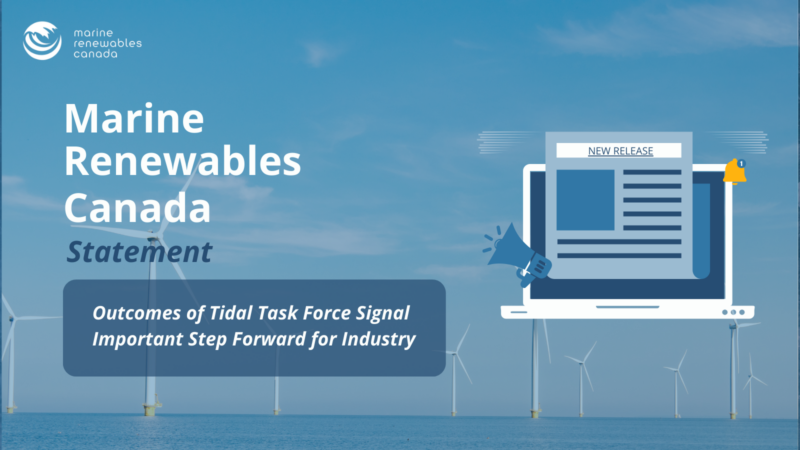Statement: Outcomes of Tidal Task Force Signal Important Step Forward for Industry

(February 28, 2024) Today, the Task Force on Sustainable Tidal Energy Development in the Bay of Fundy (“Tidal Task Force”) released its final report detailing actions and recommendations to address regulatory barriers faced by tidal energy projects.
A key outcome of the Tidal Task Force is the establishment of a “Revised” Staged Approach to authorizations under the Fisheries Act. This approach is intended to provide a fifteen-year conditional Authorization for the staged deployment of small arrays of tidal devices with clear requirements for fish protection and monitoring. Although designed to address the conditions in Nova Scotia’s Minas Passage, the revised staged approach could be adapted to tidal energy projects elsewhere in the Bay of Fundy.
Other key recommendations and actions from the Tidal Task Force include:
- Establishment of a Risk and Monitoring Working Group (“Working Group”) to support improved approaches and technologies for risk assessment and monitoring;
- A potential enhanced role for the Fundy Ocean Research Centre for Energy (FORCE) as a hub that integrates technical, environmental, and regulatory considerations while fostering innovation, practical applied science, and leadership;
- A commitment by Fisheries and Oceans Canada (DFO) to improve the understanding of risk assessment and monitoring by sharing information on its national approach to risk assessment, developing information materials on monitoring requirements for tidal energy proponents, and supporting the Working Group;
- Establishment of an oversight committee to track and monitor progress of its deliverables and to provide oversight and accountability to the Risk and Monitoring Working Group.
“The outcomes of the Tidal Task Force are a positive step forward for the tidal industry in Canada and we are appreciative of the leadership taken by Fisheries and Oceans Canada and Natural Resources Canada to address regulatory challenges facing tidal projects. Progress has been made towards establishing a viable and predictable regulatory path for projects,” said Elisa Obermann, Executive Director of Marine Renewables Canada. “However, the work is not over – efficient and effective implementation of the Task Force recommendations in close collaboration with industry is required and is critical to the overall success of this work and the advancement of the tidal sector. We look forward to continuing our collaborative relationship with Task Force members on next steps and implementation.”
The Tidal Task Force was established in June 2023 to address ongoing regulatory challenges raised by industry working in the Bay of Fundy. Specifically, it was established to:
- Build on work to date to clarify requirements for fish protection;
- Improve transparency and methodology of risk assessment and decision making for tidal stream energy device deployments; and,
- Reduce turnaround time for regulatory decisions for tidal energy projects in the Bay of Fundy.
The Task Force is co-chaired by DFO and Natural Resources Canada (NRCan). It includes members from the Government of Nova Scotia, research organizations and industry, including Marine Renewables Canada.
Related Links
Task Force on Sustainable Tidal Energy Development in the Bay of Fundy Final Report
Task Force on Sustainable Tidal Energy Development in the Bay of Fundy Interim Report
About Marine Renewables Canada
Marine Renewables Canada is the national association for tidal, offshore wind, wave and river current energy, representing technology and project developers, utilities, researchers, and the energy and marine supply chain.
Since 2004, the association has worked to build the sector by advocating for supportive policies, identifying domestic and international business development opportunities for its members, facilitating collaboration amongst its membership and broader ecosystem, providing education and outreach, and disseminating market intelligence. As part of its focus on developing the sector, Marine Renewables Canada is active in catalyzing opportunities for how marine renewable energy can contribute to achieving net-zero goals through production of green fuels such as hydrogen, as well as displacement of diesel in remote communities and marine industries.
More at www.marinerenewables.ca
Media contact:
Lisen Bassett
Marine Renewables Canada
514-246-5798
